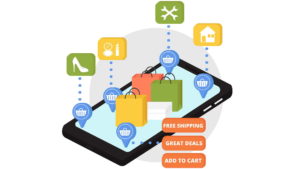Let us get digital with the desire to open your own online store with E-commerce businesses in the business-world pace.
This path is walking through every important stage of launching an online store toward e-commerce success!
Discover the future of Internet shopping!
Without anything unusual, let us travel through this comprehensive guide.
What Are The E-commerce Businesses?

Simply, the firm that works online and completes its transactions online is referred to as an E-commerce business. An e-commerce firm uses a website or online platform to present and sell its products or services to clients from anywhere in the globe instead of maintaining a real brick-and-mortar store.
Business e-commerce come in a variety of sizes, from modest setups, run from homes to major corporations with a lot of resources.
E-commerce’s capacity to reach a worldwide audience without requiring the establishment of physical storefronts in various areas is one of its key benefits. This makes it a desirable choice for business owners seeking to increase their market presence outside of their own geographic area.
In e-commerce, there are essentially two popular models:
- Business to Business (B2B): In this business model, the business of e-commerce primarily sells goods and services to other companies. These goods could be services, machinery, or raw materials that other businesses need for their own operations.
- Business to Consumer (B2C): An e-commerce company that uses the B2C model targets to sell to individual consumers. It sells goods directly to consumers who will use them as the final recipients of those goods or services.
Therefore, an e-commerce firm is a digital platform that allows companies or individuals to buy and sell goods or services online.
This gives both buyers and sellers a wider market and the convenience of online transactions.
How To Set Up A Site For E-commerce Businesses?

In the e-commerce world, several key measures must be taken to start an online store. Here is a step-by-step instruction sheet to get you going:
- Find a certain product or service niche for E-commerce businesses that you are passionate about and that has a big market for it. Do your research. To better understand your target market, competitors, and potential difficulties, conduct market research.
- Making a business e-commerce plan is important. Create a thorough business plan that includes your objectives, target market, marketing plan, financial predictions, and operational plan. This strategy will act as a road map for your online business.
- Pick a business strategy for your online store, such as B2B, B2C, dropshipping, subscription-based, or private-label products.
- Select a business-world Name and Domain for your business of e-commerce that is distinctive and memorable, and register a domain that represents your brand.
- Create Your E-commerce Website, Make the design unique to reflect your brand, and make sure the interface is user-friendly.
- Determine your strategy for sourcing or manufacturing your items. You have the choice of producing your own goods, buying in bulk, dropshipping, or working with vendors.
- Install well-known, secure payment gateways to let your clients complete transactions quickly.
- Put customer data security first by using SSL certificates and security standards to safeguard sensitive data while clients are checking out.
- Choose dependable shipping partners, and then set up shipping costs and delivery alternatives for various geographies.
- Create Captivating Product Pages to show your products for E-commerce businesses effectively with appealing product descriptions, photos, and videos.
- Apply SEO techniques to increase the visibility of your e-commerce world website on search engines and draw in organic visitors.
- Create a detailed digital marketing strategy to advertise your e-commerce store utilizing social media, email marketing, content marketing, and paid advertising.
- After your website has been thoroughly tested to ensure everything functions as it should, you can launch your e-commerce store.
- Utilize analytics tools to monitor website traffic, consumer behavior, and sales results to improve the performance of your store and make well-informed business decisions.
- To earn your consumers’ confidence and loyalty, provide outstanding customer support. Answer questions quickly and deal with problems quickly.
What Are The Typical Complications Faced By E-commerce Businesses?

E-commerce businesses should be ready for some ups and down, let’s start with,
Competition: With many companies competing for the attention of the same target audience, the internet market can be very competitive. It can be difficult to stand out and differentiate your brand.
Customer Acquisition: It can be challenging to attract new customers to your e-commerce and encourage them to make purchases, especially with the abundance of options that consumers have.
Digital Marketing: To advertise your E-commerce businesses online successfully, you need to be well-informed about a variety of digital channels, including social media, search engine optimization (SEO), pay-per-click (PPC) advertising, email marketing, etc.
Cyber security: business of e-commerce is vulnerable to online dangers including data breaches and hacking efforts, which can undermine consumer confidence and harm the company’s brand.
Logistics and shipping: Managing efficient and affordable shipping options can be difficult and time-consuming, particularly for purchases coming from outside.
Payment and Fraud Prevention: For e-commerce businesses, ensuring secure payment gateways and protecting against fraudulent transactions are major difficulties.
Customer service: Providing outstanding customer service is central to nurturing customer loyalty for E-commerce businesses, but keeping high standards can be difficult, particularly as the firm expands.
Inventory management: Monitoring stock levels, avoiding stock-outs or overstocking, and effectively managing the supply chain is essential for efficient operations.
Mobile Responsiveness: To reach a wider audience, it is wise to make sure your e-commerce world and business-world website is mobile responsive given the growing trend of mobile buying.
Regulatory Compliance: E-commerce companies must keep to numerous legal and regulatory obligations, including those relating to consumer rights, taxation, and data protection, which are different depending on the country.
Technical issues: Such issues can include handling heavy internet traffic during peak hours, integrating different software and tools, and maintaining an effective and dependable website for an incredible user experience.
E-Commerce Trends and Statistics in 2023

- Online sales are expected to account for 20.8% of retail transactions in 2023 and 24% by 2026.
- The industry for global E-commerce businesses is expected to exceed $8.1 trillion by 2026 and reach $6.3 trillion in 2023.
- In terms of sales, the US business e-commerce is anticipated to surpass $1.1 trillion in 2023.
- With a market share of 37.8% of all e-commerce sales, Amazon leads the field.
- The three e-commerce websites with the most visitors are Walmart, eBay, and AliExpress.
- 57% of online customers say they have done business overseas.
- Due to additional expenses like shipping, taxes, and fees, 48% of carts are abandoned.
- When asked to form an account, 24% of carts are abandoned.
- Due to slow shipping, 22% of shoppers abandon their carts in the business of e-commerce.
- By 2026, social media commerce is anticipated to reach $2.9 trillion.
- In the US, 96.9 million people use social media to shop.
- The majority of social network purchases are made in China, where this figure is around 50%.
- The most widely used social media network for social commerce is Facebook.
- Smartphones are used by 91% of internet shoppers to complete transactions.
- In 2023, it is expected that 6% of all retail sales will come from mobile commerce.
- By 2025, mobile commerce sales are anticipated to reach $710 billion.
- E-commerce businesses fraud is expected to cost $41 billion in 2022 and $48 billion in 2023.
- An e-commerce world scam results in an average loss of $96.
How To Stop E-commerce Fraud?

In the vast world of E-commerce businesses, frauds are a bitter reality that must never be overlooked.
A combination of precautionary measures and security best practices is needed to prevent e-commerce fraud. Here are some practical measures you can use to protect your online store:
- To spot suspect activity, use advanced fraud detection tools that examine consumer behavior, transaction patterns, and other data.
- Use the Address Verification System (AVS), which allows you to confirm the billing address that the consumer gave during the payment process.
- To increase security, during checkout, ask for the Card Verification Value (CVV) code, the three-digit number on the back of the credit card.
- Use MFA (multi-factor authentication) for all transactions and logins with customers.
- To secure data transmission between a customer’s browser and your server, Secure your business-world or e-commerce world Website.
- Analyze transaction data on a regular basis to look for any odd patterns or inconsistencies.
- Make sure your staff is trained to spot potential fraud indicators and that they follow well-known procedures for handling shady transactions.
- Make sure to constantly update your e-commerce platform, plugins, and other software with the most recent security updates to fix vulnerabilities.
- Before processing large or uncertain orders, get in touch with the customers to get their confirmation.
- Be aware of the IP addresses used for transactions and check them against blacklists for suspected fraud.
- To prevent automated bot assaults and to safeguard against fraudulent actions, use CAPTCHA or reCAPTCHA.
The Evolving Landscape of E-commerce Businesses in 2023

The following are some significant trends and advancements affecting the e-commerce world in 2023:
- As the use of smartphones rises and mobile experiences get better, mobile commerce, or m-commerce, is starting to take over as the main method of conducting online transactions.
- With all-in-one shopping experiences combined into websites like Facebook, Instagram, and Pinterest, E-commerce businesses are using social media to contact and engage customers directly.
- To offer modified shopping experiences, machine learning and artificial intelligence (AI) are being used in the business of e-commerce.

- Voice commerce is becoming more popular as a result of voice-activated devices like smart speakers.
- To offer a smooth shopping experience across numerous touchpoints, including online stores, mobile apps, physical stores, and social media, e-commerce organizations are adopting the Omni channel strategy.
- To appeal to socially conscious consumers, e-commerce companies are reacting by providing eco-friendly items, sustainable packaging, and transparent supply chains.
- The use of cryptocurrencies as a form of payment in e-commerce is becoming more widespread.
- To meet customers’ demands for faster and more dependable delivery alternatives, such as same-day and next-day delivery, E-commerce businesses are concentrating on optimizing their fulfillment operations.
- To secure the sensitive data of clients, business e-commerce continues to place a high focus on establishing strong data security and fraud protection measures.
- Buy now, pay later (BNPL) solutions, installment payments, and digital wallets are just a few of the payment choices that e-commerce companies provide.
- E-commerce companies reach clients anywhere in the world with the internet to take advantage of rising markets and cross-border sales.
- Subscription-based e-commerce services are becoming more and more well-liked since they give customers convenience and customization through routine product deliveries or hand-curated experiences.
- Some e-commerce business-world companies are establishing their niche by concentrating on particular product categories or target markets, meeting the needs of distinctive clientele.
Bonus Tips for Success in 2023

- In the e-commerce world, put the user’s needs first by making sure your website is simple to use, loads quickly, and has a simple checkout procedure. An intuitive User Interface (UI) will boost customer maintenance and conversion rates.
- Engage your business e-commerce audience on social media channels by being active there and creating a sense of community around your business, swiftly responding to messages, comments, and feedback.
- Develop a content marketing strategy for the business of e-commerce to provide interesting and useful content those appeals to your target market. High-quality content boost SEO, increases organic traffic and position your company as an authority in your industry.
- Encourage happy customers to post satisfactory remarks and comments in the customer reviews and testimonials section. Genuine testimonials are displayed to raise credibility and confidence among potential clients.
- In the e-commerce world, provide affordable prices without sacrificing the caliber of your goods or services.
- Work with influencers and micro-influencers in your niche to promote your items through sincere endorsements and reach a larger audience.
- Offer first-rate customer service over a variety of channels, such as live chat, email, and phone. Quickly respond to client questions and problems to create enduring partnerships.
- Implement loyalty programs in business e-commerce to reward loyal customers and encourage devotion to your brand.
- Test and improve different aspects of your website, advertising initiatives, and product offerings constantly.
- Adopting new technology and trends can improve the productivity, user experience, and overall success of your e-commerce firm. So hold on to innovation and have an open mind.
- Have a flexible and adaptable mentality for your E-commerce businesses. To meet the constantly shifting needs of your clients and the industry, be flexible in how you implement your plans, goods, and services.
- Add sustainable practices to your business-world processes, such as eco-friendly packaging and ethical sourcing. Customers respect brands that are socially and ecologically responsible more and more.
- Educate your clients on the worth and advantages of your goods. They can make educated purchasing selections with the help of clear and helpful content.
- For your E-commerce businesses staff, provide a friendly and encouraging work environment. Your workers will be engaged and motivated, which will help your company succeed.

- Think of pursuing available geographical or market niches. Strategic diversification can create new chances for growth in business e-commerce.
- Promote a culture of ongoing learning and development inside your company. Accept criticism, examine the data, and pinpoint areas that want improvement.
- Celebrate and recognize your e-commerce company’s successes and milestones. Recognize your team’s contributions and encourage self-importance in your achievements.
- The experiences you provide for your clients are just as important to your e-commerce success as the things you offer.
The Ending Notes

E-commerce businesses or the e-commerce world has a flora and fauna of limitless opportunities where business owners and skilled worker can turn their visions into reality. The years certainly include innovation, difficulties, and victories because the environment continues to change, but it is all worth it in the end.
Your work will fill a major part of your life, and the only way to be truly satisfied is to produce what you believe is excellent work. And doing outstanding work is only possible if you enjoy what you do.
E-commerce businesses make you create relationships that cut beyond boundaries, countries, and languages with every sale and consumer warmed by the delight of your services.
Keeping thinking,
“How can I add value to the lives of my customers and make their shopping experience extraordinary? How in the e-commerce world will I be the answer to the queries of people?
How I contribute to the digital revolution that is changing how we interact and shop with each click, purchase, and happy customer?
Therefore enter the world of business of e-commerce with confidence because the possibilities are as endless as the digital horizon itself and the future is yours to create.
E-commerce businesses, business e-commerce, the business of e-commerce, business-world, e-commerce world
Let your business e-commerce be a work of art, full of achievement, a tribute to creativity, and a demo of the strength of entrepreneurship.
Success in the dynamic world of e-commerce depends on your capacity to develop, connect with your customers, and keep an innovative mindset.
Dream big, be committed, and let your passion lead the way to excellence in the e-commerce world.
The future is up to you to create. Make it extraordinary, go ahead!
So when are you turning ideas into E-commerce businesses?













